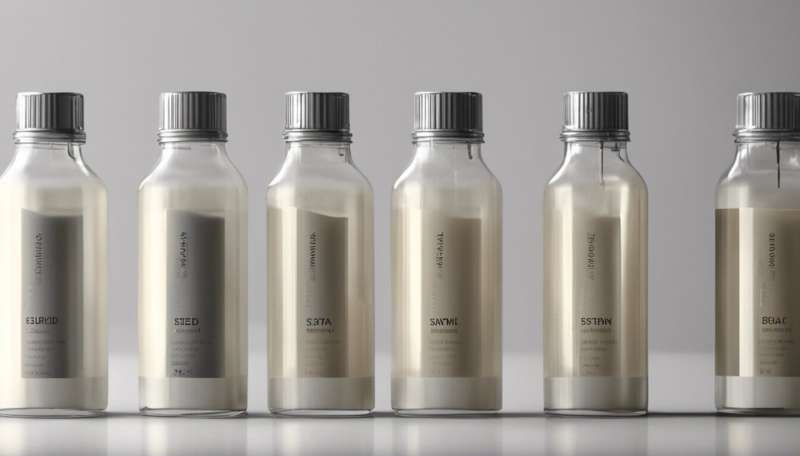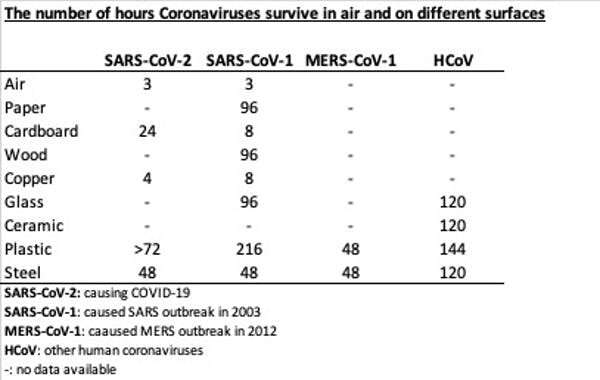Analysis: Household cleaning products effective against coronavirus

COVID-19 has only been around for a few months, so at this point scientists don't know that much about it. But more is being learned every day. We now know, for example, it can live on surfaces for up to nine days and survives in the air for a few hours. We also now know that the virus particles are shed through saliva and fluids coughed up from the lungs. And that the virus can also be shed from our faeces.
It's easy for an infected person to spread the virus particles through coughing, touching other people or leaving the virus on surfaces. Undoubtedly, hand-washing after being in public spaces is key to reduce the spread of COVID-19. But what should we be doing in our homes to eliminate it?
Two recent studies have investigated how long coronaviruses survive on different surfaces. The research looked at a number of different viruses including SARS-CoV-2—the coronavirus that has caused COVID-19. And it found that the survival times varied according to the type of surface.
The virus survived for longest on stainless steel and plastic—for up to nine days. The shortest survival times of one day was for paper and cardboard.
The amount of virus particles during this time does reduce, but it's worrying that the particles can last for days rather than hours or minutes on a surface. So, how good are the cleaning products already in your cupboards at killing SARS-CoV-2? There is some good news in the list below.
Soap and water
Soap and water are your first line of defence to remove the virus from surfaces. Soap interferes with the fats in the virus shell and lift the virus from surfaces and this is then rinsed off by water. Of course, you also need to wash your hands when you come in from the shops and wash your food as normal.
Bleach
The active ingredient in bleach—sodium hypochlorite—is very effective at killing the virus. Make sure you leave the bleach to work for 10-15 minutes then give the surface a wipe with a clean cloth. The bleach works by destroying the protein and what's known as the ribonucleic acid (RNA) of the virus—this is the substance that gives the blueprint for making more virus particles when you become infected. Be sure to use the bleach as directed on the bottle.

Surgical spirit
Surgical spirit is mostly made up of the alcohol ethanol. Ethanol has been shown to kill coronaviruses in as little as 30 seconds. Like bleach, the alcohol destroys the protein and RNA that the virus is made up of. Moisten a cloth with some neat surgical spirit and rub it over a surface. This will evaporate and you will not need to wipe it off.
Surface wipes
The active ingredient in surface wipes in an antiseptic –- usually benzalkonium chloride. The wipes work by physically removing germs through the pressure you apply when you use them, and the germs then attach to the wipe.
They also leave a layer of the antiseptic on the surface that works to kill germs. The antiseptic works well on bacteria as well as on coronaviruses that infect mice and dogs—but it seems to make no difference to the spread of human coronavirus. Antiseptics work by disrupting the fats in pathogen cells, but SARS-CoV-2 does not contain many fats. So far, there is no evidence that antiseptics can kill human coronaviruses.
Hand sanitisers
A word of warning though about hand sanitisers. The main ingredient in hand sanitisers that will kill SARS-CoV-2 is ethanol, the alcohol in surgical spirit. But its concentration in the sanitiser is very important –- it has to be over 70 % or it will not kill the virus effectively.
One thing you can also do is make sure you air out the spaces you are spending time in regularly. An infected person will produce thousands of tiny droplets which contain the virus every time they cough. SARS-CoV-2 can survive in the air for up to three hours. So by opening the window, you can remove and disperse the droplets and reduce the amount of virus in the air—which will reduce the risk of infection for others.
We are living in uncertain times but it's reassuring to know that we have some weapons we can use to fight COVID-19 in our homes. The bottom line: keep washing your hands, use 70% hand sanitiser, dust off the bleach and open a window to let in the spring air.
This article is republished from The Conversation under a Creative Commons license. Read the original article.![]()



















